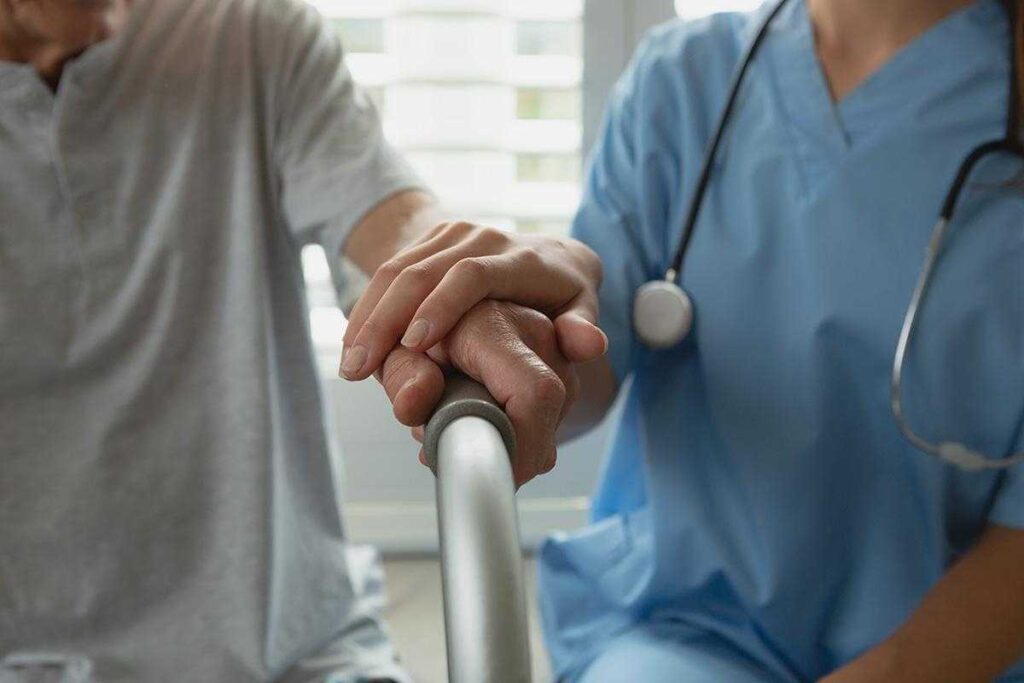Critical Information for Houston Families
According to the Centers for Disease Control and Prevention, someone in the United States experiences a stroke every 40 seconds. That’s a sobering statistic, and a compelling reason for recognizing the signs someone has had a stroke and the symptoms of an impending stroke. For adult children caring for aging parents in Houston, it could mean the difference between recovery and long-term disability for your loved one.

That’s why Pegasus Landing of Tanglewood takes stroke awareness seriously. Our team is trained to recognize the signs and act quickly. We provide personalized attention to each resident, ensuring they’re surrounded by peers and caregivers who are not only compassionate but also prepared.
Signs of Pre-Stroke That Demand Immediate Attention
Before a major stroke occurs, many people experience what medical professionals call transient ischemic attacks (TIAs) or “mini-strokes.” Those typically last minutes to hours and resolve on their own, but they should never be ignored.
Common pre-stroke warning signals include:
- Sudden numbness or weakness, especially on one side of the body.
- Brief episodes of speech difficulty or confusion.
- Temporary vision problems in one or both eyes.
- Momentary loss of balance or coordination.
- Short-term severe headaches without apparent cause.
What makes these signs particularly dangerous is their temporary nature. Many seniors (and their caregivers) dismiss these symptoms because they quickly improve. However, approximately one in three people who experience symptoms of an impending stroke will have a major stroke within a year if left untreated.
What Are Signs of a Stroke? The FAST Method
Medical experts recommend the FAST approach for identifying stroke symptoms:
- Face: Ask the person to smile. Does one side of the face droop?
- Arms: Ask them to raise both arms. Does one arm drift downward?
- Speech: Ask them to repeat a simple phrase. Is their speech slurred or strange?
- Time: If you observe any of these signs, call 911 immediately.
The FAST method identifies approximately 70% of strokes. Some strokes present with less typical symptoms, especially in women and older adults.
Often Missed Unusual Stroke Symptoms
Beyond the classic signs someone has had a stroke, there are unusual stroke symptoms that families should watch for. These include sudden hiccups (more common in women), nausea or vomiting (often misdiagnosed as stomach flu), fainting, or severe dizziness. Other red flags are sudden behavioral changes or confusion, extreme fatigue or weakness, and pain, particularly on the face or limbs.
Women are 33% more likely than men to report these atypical symptoms; additionally, they are more likely to mention feeling general weakness, disorientation, and anxiety during stroke onset compared to men.
Other Gender Differences in Stroke Presentation and Care
Research shows substantial differences in how strokes affect men versus women. Women are more likely to experience unusual stroke symptoms and typically arrive at hospitals later than men after symptom onset, so they’re less likely to receive tPA treatment within the recommended time window.
Additionally, female stroke survivors report higher rates of post-stroke depression and cognitive impairment. These differences highlight the need for gender-specific awareness of stroke symptoms and treatment approaches.
What Is Ischemic Stroke?
An ischemic stroke definition, in simple terms, is a blockage that prevents blood from reaching part of the brain. They account for 87% of all strokes and occur when a blood clot blocks an artery supplying blood to the brain.
Risk factors for ischemic strokes include high blood pressure (affecting nearly 50% of Houston adults over 65), high cholesterol, diabetes, and smoking. Heart disease, family history, and advanced age also contribute to the probability of these strokes. But understanding the nature of ischemic strokes helps families recognize that many risk factors can be managed through lifestyle changes and proper medical care.
Houston’s Stroke Treatment Landscape
Houston has comprehensive stroke centers equipped with the latest technologies for rapid diagnosis and treatment. The standard treatment for ischemic strokes includes:
- Clot-busting medications (tPA): Most effective when administered within 3-4.5 hours of symptom onset.
- Mechanical thrombectomy: Surgical removal of large clots, available at specialized centers.
- Rehabilitation: Including physical, occupational, and speech therapy.
Houston Methodist Hospital, Baylor St. Luke’s Medical Center, and Memorial Hermann Hospital provide world-class stroke care, but outcomes significantly improve when treatment begins within the first hour after symptoms appear. That emphasizes why recognizing the signs of a stroke quickly is critical.
Prevention Strategies for Houston Seniors
Houston’s hot, humid climate creates additional considerations for stroke prevention. Proper hydration, especially during summer months, is essential for senior health. Also, managing heat exposure for seniors with cardiovascular risk factors can help prevent complications.
Regular blood pressure monitoring and following a heart-healthy diet (the Mediterranean diet shows particular promise) also contribute to stroke prevention. Staying physically active with appropriate indoor options during extreme weather helps maintain cardiovascular health, but be mindful of hydration and potential overexertion. And regular screenings can identify early signs of pre-stroke conditions before they progress.
How Our Community Supports Every Resident
Recognizing stroke symptoms quickly is vital, but so is having a support system in place for recovery and ongoing care. That’s where Pegasus Landing of Tanglewood can be of service. Our assisted living and memory care senior experts provide caregiving in a resort-style retirement community, with amenities like wellness programs, available room service, and on-site physical, occupational, and speech therapy.
We can be your partner in senior wellness and recovery; a phone call or email will start the process.
We Can Help Your Loved One Thrive After Stroke Recovery
At Pegasus Landing of Tanglewood, our compassionate caregivers help families manage the challenges families face after a loved one experiences a stroke. Our specially trained team members create personalized care plans that support recovery while maintaining dignity and independence. Contact us to learn how we can help your family member thrive in a comfortable environment that is designed for senior well-being.
*This article should not replace medical advice. Talk with your doctor regarding any issues you or a loved one may experience.
